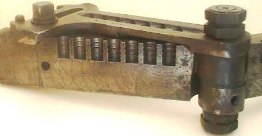CnC Router Project
I created a mold of a hockey puck depicting the CMU club hockey team. I was unable to create a useable model due to the inability to remove the ice from the mold. The pictures are shown below:
I created a mold of a hockey puck depicting the CMU club hockey team. I was unable to create a useable model due to the inability to remove the ice from the mold. The pictures are shown below:
I decided to create a model DJ controller with the laser cutter. The outcome currently available was the first draft I made, the design on Rhino displays the perfected version, where I will go into cut it on the coming Monday and update with pictures of the fully functioning controller. Pictures below:
For my mold making project, I took a stress ball and impaled it with a stake to create a trophy of defeating the stress of college. Pictures below of the steps taken to create this mold:
SFDS is a fabrication and design workshop based in Brooklyn, NY. Their company works with the development of props, furniture and scenery for their clients using a CNC Router. Some of their work is displayed below:

Wall Lighting

Outdoor Lamp
SFDS does not exclusively use the CNC Router for their projects, but their site gives multiple examples of the works they’ve produced:
www.sfdshop.com/projects-events/Diesel.html
Laser cutting has opened up many new possibilities for design in architecture, clothing, lighting, art, and furniture. The precision and control offered by the laser cutter provides users with the ability to design with pinpoint accuracy to what they see in their minds. Some interesting designs of furniture that have been thrown around are below:

Laser Cut Chair

4-Way view of a laser cut chair
The blueprint of laser cutting offers customizability on top of what was originally created by the designer. The flexibility provided allows for further innovations to occur through the laser cutter tool.
The multiple materials that can be used with a laser cutter also opens up more possibilities for the design of furniture such as the use of metals, stone, or other flexible materials.

Laser cut bookshelf
Recently the ESA (European Space Agency) has partnered up with a London-based architecture firm to explore the possibility of using 3D printing technology to construct buildings on foreign planets in space. The concept involves utilizing the existing sand/dirt on the surface of the planet as the material to create the structures.
The process will involve introducing a binding agent to the sand to create a sand-like building material shown below:

Block of sand-like building material
Initial work on this 3D printing project has revealed findings that the speed at which a base/building can be built would be well within a week. Their initial testing of the process will begin on the moon.
Initially bullet molding blocks consisted of a single cavity for molding before WWI, after WWI emergence of dual/quadruple cavity blocks became popular with individual casters. Eventually sextuple cavity blocks for bullet molding came into play for law enforcement groups and shooting ranges. The bullet molds with 6 cavities were referred to as “Arsenal/Armory Moulds”

Single Bullet Mould

Arsenal/Armory Moulds (6 Cavity)
Initially bullet molding revolved around a base pour which would cause discrepancies in consistency with the base of the bullet, this resulted in unintended reductions in accuracy. Eventually Dr. Franklin Mann came up with the concept of a nose-pour which allowed the crafting of a base that would be more square to the launching chamber of the firearm in question.

Nose-Pour Mold
More Examples of Bullet Molding and Innovations: www.lasc.us/Fryxell_Book_Chapter_9_MouldsMouldDesign.htm